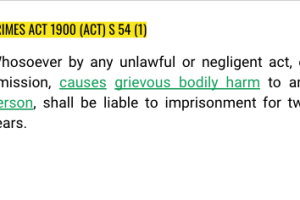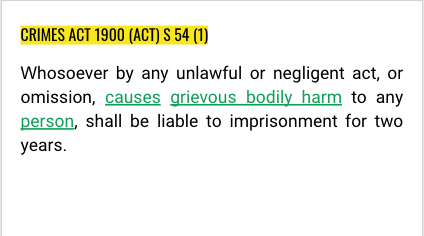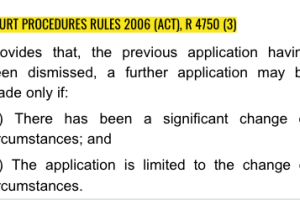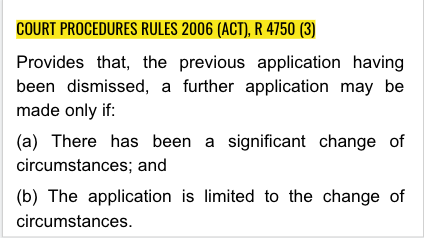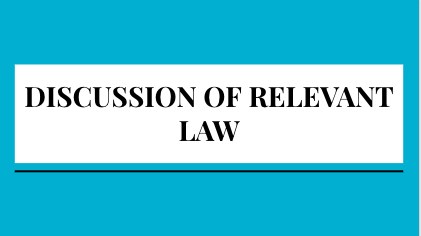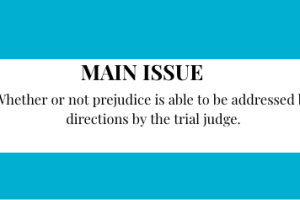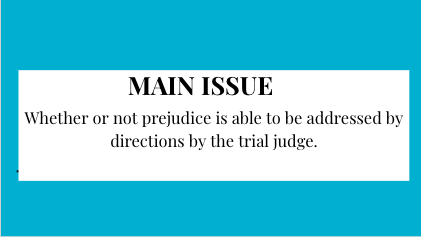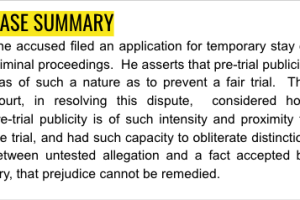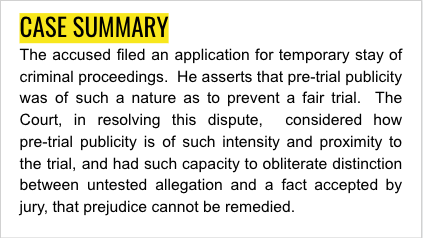Accused Charged with Sexual Assault Seeks Stay of Proceedings

R v Lehrmann (No 3) [2022] ACTSC 145 (21 June 2022)

The accused filed an application for a temporary stay of criminal proceedings. He asserts that pre-trial publicity was of such a nature as to prevent a fair trial. The Court, in resolving this dispute, considered how pre-trial publicity is of such intensity and proximity to the trial and had such capacity to obliterate the distinction between an untested allegation and a fact accepted by the jury, that prejudice cannot be remedied.

Facts:
The accused in these proceedings is charged with an offence of engaging in sexual intercourse without consent, contrary to s 54(1) of the Crimes Act 1900 (ACT). The accused in the present matter applied to have his trial either permanently or temporarily stayed because he said he could not possibly have a fair trial in light of the extensive media reporting and public commentary by prominent personalities about the complainant’s allegations.
The accused brought forward a further application, made orally outside normal sitting hours, for a temporary stay of his trial, which is currently due to commence next Monday. The first application was determined in a written judgment made publicly available only in redacted form.
The offence with which the accused is charged is alleged to have been committed in the early hours of 23 March 2019. The complainant made a statement to police shortly thereafter, on 1 April 2019. However, following the announcement of a federal election, the complainant informed police that, in light of her workplace demands, she did not wish to proceed further with the complaint. The Crown case at trial will be that the decision not to proceed with the complaint at that time was prompted by the complainant’s consideration of her duties to her employer in the delicate period leading up to the federal election.
In early January 2021, almost two years have passed, the complainant decided that she wished to proceed with the complaint. To that end, she considered it appropriate to resign from her employment, then with Michaelia Cash, and proffered her resignation. The Crown case will be that, with a view to forestalling the mudslinging she anticipated would flow from that decision, she also decided to go public with her allegation against the accused and, separately, with her concerns as to the manner in which her initial complaint had been handled within Parliament House. The complainant participated in a preliminary interview with Ms. Lisa Wilkinson, a well-known journalist, on 27 January 2021.
On 2 February 2021, Ms. Wilkinson recorded an interview with the complainant which, in due course, became the basis for a program hosted by her. On 4 February 2021, the complainant contacted police to communicate her resumed interest in proceeding with a criminal complaint.
On 15 February 2021, the program prepared by Ms. Wilkinson was broadcast on The Project. On 5 August 2021, the accused was summoned to appear in Court in September 2021 to face the present charge.
On 19 June 2022, the Australian television industry held what until the interference of the COVID-19 pandemic were its annual awards for excellence in Australian television, known as The Logie Awards. Ms. Wilkinson received a silver Logie for her interview broadcast on The Project.
Upon receiving the award, Ms. Wilkinson gave a speech in which she openly referred to and praised the complainant in the present trial. The award and the content of the speech have been the subject of extensive further commentary. Each of the radio presenters assumed the guilt of the accused.

Issue:
Whether or not prejudice is able to be addressed by directions by the trial judge.

Applicable law:

(a) There has been a significant change of circumstances; and
(b) The application is limited to the change of circumstances.

Analysis:
The prejudice of such representations so widely reported so close to the date of empanelment of the jury cannot be overstated. The trial of the allegation against the accused has occurred, not in the constitutionally established forum in which it must, as a matter of law, but in the media. The law of contempt, which has as its object the protection of the integrity of the court but which, incidentally, operates to protect freedom of speech and freedom of the press, has proved ineffective in this case. The public at large has been given to believe that guilt is established. The importance of the rule of law has been set at nil.
The Crown submitted that the vaccine for the vice of pre-judgment is to empower the jury by giving appropriate directions reminding them that they are uniquely placed to determine the case and directing them to disregard the views of others, who will not have heard all of the evidence.
When the same assumption of guilt as is being made widely on social media is made and widely broadcast by popular breakfast radio hosts such as Amanda Keller and Brendan Jones, it may safely be inferred that the impact of the recent publicity is large and that its full impact cannot be known. Delay of the trial at this stage wastes the valuable resources of the Court, not least among which is the horrifying prospect that a judge of the Court should find herself idle for four weeks during the time set aside for this trial at the expense of other accused persons.
A new jury panel would have to be summoned if the trial is delayed. However, the recent publicity changes the landscape because of its immediacy, its intensity, and its capacity to obliterate the important distinction between an allegation that remains untested in law and one that has been accepted by a jury giving a true verdict according to the evidence in accordance with their respective oaths or affirmations.
Conclusion:
The Court is not satisfied that any directions to the jury panel prior to empanelment or, in due course, to the jury can adequately address prejudice. The Court concluded that the trial date of 27 June towards which the parties have been carefully steering must be vacated.

